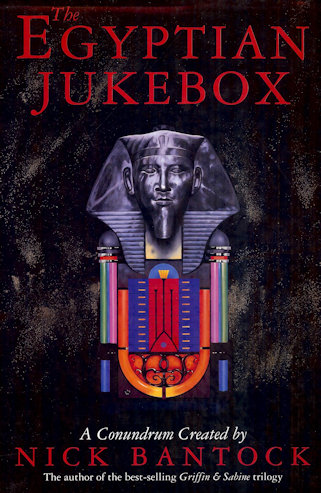The Egyptian Jukebox

The Egyptian Jukebox
The Egyptian Jukebox is an intriguing puzzle book and certainly worth a read, though it is not one that you are likely to return to time and again.
Written by Nick Bantock in 1993 the titular jukebox is a cabinet having 10 drawers, each associated with a different Egyptian God, and all lovingly photographed. Every drawer is stuffed with creepy knick-knacks, coins and postcards from around the world. A short, often ghostly story accompanies each drawer and gives context to the contents.
The creator of the jukebox poses a single riddle: “Where do my worlds join?”. To help solve it, cryptic clues have the reader running around each drawer like a rat in a maze.
This is an enjoyable and solvable puzzle. Small clues scattered throughout the book must be pieced together to find the correct path through every drawer. It’s nicely structured so that the reader can see that they’re making progress, but different stumbling points present themselves on each page and require a slightly different approach to solve.
Solving the cryptic clues requires much trial and error, which could be frustrating. Fortunately, since the maze is all laid out before you in each drawer, it quickly becomes clear when you are on the right path or when you have reached a dead-end. If you get really stuck, the solution to the riddle, though not the method of reaching it, is given at the back of the book. This of course means that there is no competition and no prize to be won apart from a sense of personal satisfaction.
The artwork and the stories are all very moody, and though the production values are high, the book is not very attractive or interesting in the long term. Once the riddle is answered, the book is likely to end up gathering dust on a shelf, but it is a fun ride while it lasts.
If you’re stuck with the puzzle, see this post for some hints to get you started and full solutions for the first 5 drawers.
WOW! a solution would be great, as there currently isn’t one anywhere else on the web, and Nick Bantock doesn’t really engage in helping people out with it any more. Much appreciated! When will it be coming? Soon I hope!
Good to hear from you, and interesting to note that there’s a demand for solutions to this puzzle book. I should finally get around to putting it together in a post :). Follow me on twitter if you want the best chance of seeing when I produce it! https://twitter.com/DGerontius Happy reading!
Some hints and the full solution for the first 5 Drawers of the book are now available at http://dreamsofgerontius.com/2016/11/17/the-egyptian-jukebox-solution/
I agree with your assertion that ‘though the production values are high, the book is not very attractive or interesting in the long term. Once the riddle is answered, the book is likely to end up gathering dust on a shelf, but it is a fun ride while it lasts.’
Another, very similar visual puzzle book that I have seemingly returned to repeatedly over the years is The Eleventh Hour by Graeme Base. Fundamentally a childrens’ book, it is more whimsical, creative, and delightful than The Egyptian Jukebox, and maintains a commensurate level of production value. Give it a try if you like!
I am a massive fan of the Eleventh Hour! http://dreamsofgerontius.com/2016/09/21/the-eleventh-hour/